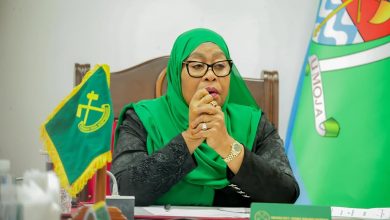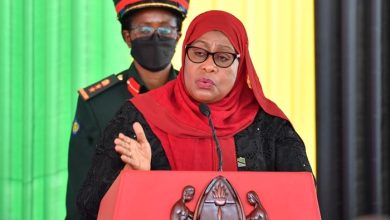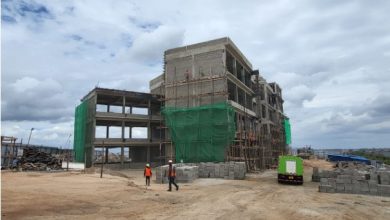2024: Joy as JNHPP adds 1000MW to national grid

DODOMA: AS the year 2024 comes to an end, Tanzanians are smiling after witnessing the Julius Nyerere Hydropower Project (JNHPP) contributing over 1000 Megawatts (MW) to the National Grid which significantly bolstered electricity availability across the country.
This significant increase in power generation from the multibillion shilling project boosted socio-economic activities as it mitigated power rationing which used to recur.
Speaking recently during the foundation stone-laying ceremony for the 400kV power transmission line project and the expansion of 400kV substations from Chalinze, Coast Region to Zuzu in Dodoma, Deputy Prime Minister and Minister for Energy, Dr Doto Biteko said the JNHPP has reached 99.6 per cent completion.
Therefore, the power transmission line project that has been inaugurated in Dodoma will enable all the amount of electricity generated from the JNHPP reach all regions in the Northern Zone, Lake Zone, Southern Highlands Zone, Central Zone and Western Zone, as well as mines, industries and strengthen the country’s position in power trading in the Eastern and Southern Africa.
Dr Biteko said the country has improved electricity generation following switching-on of five turbines of the JNHPP which have added a total of 1,175 MW to the National Grid. The five turbines are labelled as 9, 8, 7, 6 and 5.
The country’s flagship power plant, currently under construction, is equipped with nine turbines which once fully operational will collectively generate a total of 2,115 MW. Each turbine of the plant can produce 235MW.
The 6.6tri/- mega power project ever in history of the country is named after the country’s Founding Father Mwalimu Julius Nyerere who initiated the idea.
ALSO READ: JNHPP, Dodoma shift, TZ realises Nyerere’s vision
Dr Biteko attributed the stunning implementation of this project to the six phase government’s consistence disbursement of funds and effective supervision.
Furthermore, he noted that President Dr Samia Suluhu Hassan has been offering guidance on the best ways to execute the project in her pursuit of ensuring the country attains reliable electricity to meet the growing demand resulting from the vibrant socio-economic activities development.
He said enduring government’s commitment to executing power generation, transmission and distribution projects make Tanzania to be the champion in Africa in terms of power distribution to its citizens, both in rural and urban areas.
According to the Rural Energy Agency (REA) currently 99.67 per cent of all villages across the country are connected with electricity.
Dr Biteko said successful execution of various energy projects across the country including the JNHPP increased the number of power plants which substantially has fortified the country’s installed generation capacity to 3,169.26 MW compared to 1,938.35 MW in December 2023.
Moreover, he said that the peak power demand has reached an unprecedented 1,888.72 MW, a record high since the country’s independence reflecting the country’s economic growth. Last year, the country’s peak power demand stood at 1,410MW.
Permanent Secretary in the Ministry of Energy, Engineer Felchesmi Mramba said Tanzania has emerged as the largest power producer in East Africa, the situation which provides an opportunity for the country to engage in power trade with other African countries including Burundi, Rwanda, Uganda and Kenya.
ALSO READ: JNHPP third power turbine switched on
Meanwhile, Tanzania Electric Supply Company (TANESCO) Managing Director Engineer Gissima Nyamo-Hanga said the recent launched power transmission project from Chalinze to Dodoma involves construction of a 400 kV transmission line from Chalinze to Dodoma, spanning 345 kilometers and the expansion of substations at Chalinze (400/220/132 kV) in Coast Region and Zuzu (400/220/33 kV) in Dodoma.
Also, he said the project will facilitate power interconnection between the Eastern Africa Power Pool (EAPP) and the Southern Africa Power Pool (SAPP) thereby enabling regional power trading.
He reminded that the project is fully funded by the government at a total cost of 513bn/- , with the contractor which is TBEA Company from China having already received an advance payment of 107.93bn/-, equivalent to 20 per cent of the total cost.
He noted that various works have started on the transmission line construction and the project is expected to be completed by September 2026, alongside the substation expansion works.
World Bank’s Regional Director for Infrastructure for Eastern and Southern Africa, Ms Wendy Hughes commended the government of Tanzania for focusing on strengthening the National Grid, which is vital in ensuring energy security and development at large. She said a robust power transmission system acts as a supportive infrastructure for reliable electricity supply in the country.
Ms Hughes said the transmission line project aligns with Africa’s plan led by the World Bank and the African Development Bank (AfDB) to connect 300 million people with electricity by 2030.
ALSO READ: JNHPP safe from effects of rains – Biteko
Reacting on the progress of the project, Director and Founder of Akberalis Hardware and Electric Limited, Mr Akberalis Jozer highlighted the plant’s capacity of generating 2,115 Megawatts (Mw) as a game-changer for both households and industrial power needs.
He said switching on of five turbines of the JNHPP has strengthened electricity availability for their firm to operate smoothly.
Akberalis Hardware and Electric Limited which is based in Dar es Salaam specialises in the production of aluminium ladders and Polypropylene (PP) ropes.
Mr Jozer said effective power supply across the country allows manufacturers to increase production, create more job opportunities and contribute to the nation’s revenue.
“It is much easier to plan expansion of industries if there is sufficient electricity to run the machines,” he said.
Business and Marketing Expert, Mr Medard Wilfred based in Mwanza lauded the government’s commitment to expediting the implementation of the project expressing his confidence that sufficient power generation will spur small, medium and large sized industries’ expansion and growth at large.
“In any country, electricity is the engine of all development sectors,” Mr Wilfred emphasised anticipating that Tanzania is poised to undergo industrialisation, a high tech-driven economy.
Moreover, Mr Wilfred said that sufficient electricity supply would complement other economic infrastructures including the Standard Gauge Railway (SGR), airports, roads and ports, facilitating business growth and transfer of technology.





